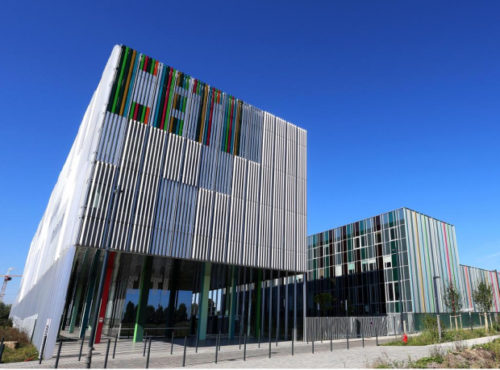 Feedback from our participation in the IACDE International Convention 2023
Feedback from our participation in the IACDE International Convention 2023
Feedback about our Visit of the Made in France trade fair organised by Première Vision
23/09/2020 by Carmel Mc Donald
 Pictures of Made in France Fair Edition 2020 © Alexandre Gallosi
Pictures of Made in France Fair Edition 2020 © Alexandre Gallosi
How and why turn to Made in France? Is it possible to relocate the textile industry?
Our team met at the Carreau du Temple in Paris on 1st & 2nd September to attend the Made in France show, organised by Première Vision.
The Made in France fair is THE Parisian show for tricolor manufacturers. We featured:
- A hundred factory manufacters exhibitors who came to highlight their know-how and expertise - 4 conferences on a hot topic: the relocation of the textile industry - A hackathon to provide concrete solutions to brands looking for industrial partners to produce in France - More than 3500 visitors, professionals from the fashion industry looking for industrial skills.
Our president Philippe BLANCHART had the chance to attend the first two conferences of the show :
« THE LOGIC OF THE CHAIN FROM A TO Z » led by Pascal Gautrand, founder of Made in Town and Première Vision consultant and with the participation of Eric Boël, Manager of Les Tissages de Charlieu and Thomas Huriez, President of 1083.
« THE BEST COLLABORATIVE PRATICES » with the participation of Minister Agnès Pannier-Runacher, Guillaume de Seynes, Chairman of the Fashion and Luxury Goods Sector Strategy Committee, Yves Dubief, President of the Union des Industries Textiles, Guillaume Gibault, President of Slip Français, Léa Marie, Deputy Director Clothing at IFTH, Sophie Pineau, member of the GFF Board of Directors and President Getex, Marc Pradal, President of UFIMH and CEO of Kiplay and Clarisse Reille, Managing Director of DEFI.
Philippe enlightens us on what he retained from these exchanges :
« Through these 2 conferences, we felt that the COVID crisis played a catalytic role and highlighted the textile sector in the front line for the manufacture of masks. Indeed, for 30 years this sector has been dismantled due to the relocations towards Asia and carried away by Fast Fashion.
Since March, faced with the shortage of masks, particularly for the nursing staff, the different actors of the sector have mobilized, got to know each other, shared their know-how and finally realized that a Made in France textile sector still has its meaning.
Some emerging brands such as 1083 or Slip Français have made it their business strategy and today it is experiencing a certain success. The challenge now for the sector, beyond the manufacture of masks, is to work on the implementation of a new sustainable Made in France economic model and to accompany the digital and organisational transformation of companies to achieve this objective. »
 Pictures of Made in France Fair Edition 2020 © Alexandre Gallosi
Pictures of Made in France Fair Edition 2020 © Alexandre Gallosi
Personaly, I had opportunity to attend two conferences:
« I RELOCATE, YOU RELOCATE, WE RELOCATE » led by Lucas Delattre, Professor of Communication at the IFM and the participations of Paul Boyer, Founder and Managing Director LINportant, Yves Jego, President of Pro France / Origine France Garantie and Rodolphe Meersschaert, Production Manager agnès b.
« TO THE RECONQUEST OF THE TERRITORIES » under the leadership of Pascal Gautrand, founder of Made in Town and Première Vision consultant and the participations of Nadia Bedar, Director of the UNESCO World Heritage candidature project for the country of Millau, Sylvie Bénard, President of Paris Good Fashion and Laurent Vandenbor, General Delegate for Fashion in the West.
This second day of conferences began with this observation: globalisation has reached its paroxysm. Yves Jego illustrated this reality with the anecdote of pickle production: a few years ago, some French industries chose to relocate the production of pickles to India (where the climate allows for a larger harvest and where the low cost of labour leads to lower production costs). Faced with this new competition, smaller producers have had to adapt and finally have found a market in Eastern Europe.
The result: today more than 80% of the pickles consumed in France come from China and the majority of French pickle production is sent thousands of kilometres away before being consumed…This is one of the many aberrations of globalisation…
This example perfectly illustrates the limits of our system and the need to return to « peasant common sense ».
 Pictures of Made in France Fair Edition 2020 © Alexandre Gallosi
Pictures of Made in France Fair Edition 2020 © Alexandre Gallosi
Relocate, yes, but how and at what cost?
In spite of the collective awareness and the best will of Manufacturers, the setting of relocation comes up against an economic reality: the consumer, although more and more demanding about the origins of his products, will not be ready to pay more for his product than usual.
Relocation requires a change in the business model with products with divided margins (compared to products made in China) and a rethink of product marketing. The latter must be oriented towards transparency of margins, origin of the material and place of manufacture, thus making it possible the responsibility of consumer during his purchase.
But, what does “French” origin mean today?
The Customs Code considers a product as a French product if the last main work must be carried out in France and 45% of the unit price is produced in France. This definition certainly does not reflect the consumer definition of a French product. In the collective imagination, “made in France” rather refers to a product whose raw materials are produced in France and each of the manufacturing stages as well… A 100% tricolor product in fact !
Paul Boyer, Director of the LIN GROUP, explains: France is the world’s leading producer of linen, yet once the harvest is over, the flax will transit through different countries (Asia, Italy…) to continue its design stages: scutching, combing, spinning, weaving, knitting, finishing… So, can a linen t-shirt be labelled as “made in France”?
The notion of “Made in France” must be redefined to ensure real transparency for the consumer. It must also be better protected, since today the “Made in France” label is very little controlled, based on declarations and therefore subject to plenty of marketing frauds.
 Pictures of Made in France Fair Edition 2020 © Alexandre Gallosi
Pictures of Made in France Fair Edition 2020 © Alexandre Gallosi
Is this possible on complex products such as textiles? From the production of the fiber to the assembly of the finished product, is it possible to create 100% French products?
The French territory is facing a lack of skills due in part to the disenchantment with manual trades. It is certainly not Rodolphe Meersschaert, Production Manager agnès b, who will tell you the opposite since he is desperately looking for a Manufacturer to produce his costumes in France.
The know-how no longer exists. And when it does exist, the Industries are not always able to meet the requirements of quantities or prices and have every difficulty in recruiting. Relocation induces a societal change and an increase in the value of manual trades.
So, is relocation possible?
Yes, with one condition: the need to collaborate and federate the players. A brand, a company or a government cannot carry the relocation project alone. It is necessary to bring together the common players in the same area to create a dynamic and enable the success of the project.
Well, the “Made in France” trade show came to an end, leaving us with the conviction of a Textil sector more than committed to its reform and the feeling of having met convinced, positive actors ready to unite in order to make a success of the project.
Find all the replays of the conferences on the website: https://www.madeinfrancepremierevision.com/fr/news/
23/09/2020 by Carmel Mc Donald



